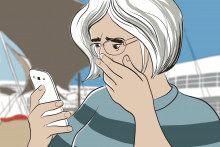U-Today
Free - in store
 News
NewsEén centrale tool om enquêtes te maken, verspreiden en te analyseren. Vanaf 1 september geldt de Nederlandse aanbieder CrowdTech als standaard voor de hele UT. Andere vragenlijstsoftware wordt niet meer ondersteund.
 News
NewsOne central tool for creating, distributing and analysing surveys: from 1 September, the Dutch provider CrowdTech will be the standard for the entire University of Twente. Other survey software will no longer be supported.
 News
NewsWat zijn de onderliggende oorzaken voor het tanende actieve studentenleven op de UT? Die vraag staat centraal in een enquête van de University Innovation Fellows en de Student Union.
 News
NewsWhat are the underlying causes for the declining student engagement at the UT? This question is the focus of a survey by the University Innovation Fellows and the Student Union.
 News
NewsWerk en woonruimte geven vaak de doorslag voor internationale afgestudeerden om hier te blijven. En Nederlands spreken kan ook geen kwaad, blijkt uit een peiling.
 News
NewsHaving a job and a place to live are often key for international graduates in deciding whether to stay here or not. And speaking Dutch doesn’t hurt either, a poll reveals.
 News
NewsDe UT heeft een extern bedrijf naar studenten laten bellen om enquêtes af te nemen, tot groot ongenoegen van de Uraad. Veel studenten begrepen niet dat het bedrijf namens de UT belde. Ook vonden ze het een inbreuk op hun privacy.
 News
NewsThe UT has asked an external company to call students to conduct surveys, much to the dismay of the University Council. Many students did not understand that the company was calling on behalf of the UT. They also felt it was an invasion of their privacy.
 News
NewsStudenten van hogescholen en universiteiten zijn ongeveer even tevreden met hun opleiding als vorig jaar tijdens de coronacrisis. Dat blijkt uit de nieuwe editie van de Nationale Studenten Enquête. De UT scoort bovengemiddeld.
 News
NewsStudents at higher education institutions are roughly as satisfied with their study programme as last year during the coronavirus crisis. This emerges from the latest edition of the National Student Survey. The UT scores above average.
 News
NewsUT-medewerkers en studenten krijgen in verschillende mate te maken met grensoverschrijdend gedrag. Dat blijkt uit een verkennend onderzoek van U-Today onder de UT-gemeenschap. Het merendeel van de respondenten weet niet waar zij met hun klachten terecht kunnen.
 News
NewsUT employees and students face varying degrees of transgressive behavior. This is evident from an exploratory research project by U-Today amongst the UT community. The majority of respondents do not know where to turn with their complaints.
 News
NewsHoe vaak zie jij – als student of medewerker van de UT – grensoverschrijdend gedrag gebeuren? Heb je daar persoonlijke ervaringen mee? Wat doe je daaraan? Met deze enquête wil U-Today grensoverschrijdend gedrag op de UT in kaart brengen.
 News
NewsHow often do you - as a student or employee at UT - see transgressive behaviour happen? Do you have personal experiences with it? What do you do about it? With this survey, U-Today wants to map out transgressive behavior at the UT.
 News
NewsDe helft van alle wetenschappers maakt zich weleens schuldig aan dubieuze onderzoekspraktijken. Zelfs het verzinnen of manipuleren van onderzoeksresultaten komt regelmatig voor.
 News
NewsHalf of all scientists are occasionally guilty of dubious research practices. Even fabrication or manipulation of research results is a regular occurrence.